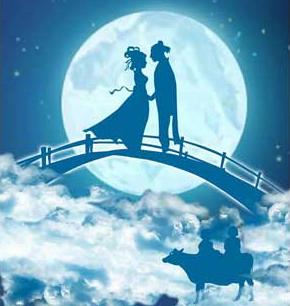牛郎织女的故事

牛郎织女是一个很美丽的千古流传的爱情故事,是我国四大民间爱情传说之一。另外,每年农历七月七日,有百鸟到银河搭鹊桥,牛郎织女相会的美好传说。所以,这一天被称为七夕、七夕节、乞巧节、少女节或女儿节,现代又被称为中国情人节。另有同名黄梅戏电影、电视连续剧等。
the cowherd and the girl weaver
on the east bank of the heavenly river(1) lived a girl weaver, daughter of the emperor of heaven. she worked hard year in and year out, weaving colourful clothes for gods and goddesses.
since she lived all alone, the emperor took pity on her and allowed her to marry the cowherd on the west bank of the river. however, she stopped weaving after she was married. greatly outraged, the emperor forced the girl back across the river and allowed her to join her husband only once a year.
from xiao shuo (folk tale)
on the seventh day of each autumn, magpies would suddenly become bald-headed for no obvious reasons at all. according to legend, that day the cowherd and the weaver met on the east bank of the river, and magpies were made to form a bridge for them. and for this reason the down on their heads was worn out.
from er ya yi (book of plants and animals)
(1) the heavenly river: the milky way.

牛郎织女是一个很美丽的千古流传的爱情故事,是我国四大民间爱情传说之一。另外,每年农历七月七日,有百鸟到银河搭鹊桥,牛郎织女相会的美好传说。所以,这一天被称为七夕、七夕节、乞巧节、少女节或女儿节,现代又被称为中国情人节。另有同名黄梅戏电影、电视连续剧等。
the cowherd and the girl weaver
on the east bank of the heavenly river(1) lived a girl weaver, daughter of the emperor of heaven. she worked hard year in and year out, weaving colourful clothes for gods and goddesses.
since she lived all alone, the emperor took pity on her and allowed her to marry the cowherd on the west bank of the river. however, she stopped weaving after she was married. greatly outraged, the emperor forced the girl back across the river and allowed her to join her husband only once a year.
from xiao shuo (folk tale)
on the seventh day of each autumn, magpies would suddenly become bald-headed for no obvious reasons at all. according to legend, that day the cowherd and the weaver met on the east bank of the river, and magpies were made to form a bridge for them. and for this reason the down on their heads was worn out.
from er ya yi (book of plants and animals)
(1) the heavenly river: the milky way.
 八年级下册英语书
八年级下册英语书 八年级上册英语书
八年级上册英语书 七年级下册英语书
七年级下册英语书 七年级上册英语书
七年级上册英语书 四年级上册英语书
四年级上册英语书 六年级下册英语书
六年级下册英语书